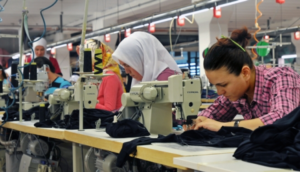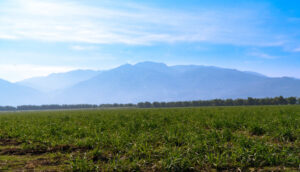World leaders gathered in Belém, Brazil, last week with an unusually clear message: climate action must be people-centered. Before COP30 even officially opened, 43 countries and the European Union signed the Belém Declaration on Hunger, Poverty, and People-Centered Climate Action — committing to, among other things, strengthening support for smallholder farmers. It’s an encouraging sign that farmer resilience is finally a priority of the global climate debate.
But as negotiations continue in Brazil, the critical question remains: how? How do we deliver on these commitments when smallholder farmers receive less than 1% of global climate finance, even as they steward critical landscapes and produce a third of the world’s food? For corporate leaders serious about building resilient supply chains, the answer lies in an often-overlooked bridge: the local agricultural enterprises that connect farmers to markets, inputs, and training to build climate-resilient livelihoods.
The Scale of the Challenge
Agriculture sits at the intersection of our most pressing global challenges. Small-scale farming supports over 500 million families worldwide, making it essential for both food security and poverty alleviation. But though smallholder farmers produce minimal greenhouse gas emissions, they bear the brunt of climate impacts, including increasing droughts, extreme weather, and crop disease outbreaks.
Living on the frontlines of the climate crisis, these rural communities possess the knowledge and relationships needed to lead us into a resilient future. They understand local ecosystems, have deep expertise in the regenerative farming practices needed to combat the climate crisis while restoring nature, and are already innovating with limited resources. For example, Indigenous farmers in many parts of the world have long practiced low- or no-till agriculture, as well as agroforestry (integrating trees with crops or pasture land). What they lack isn’t know-how, but access to the capital that would allow them to scale proven solutions.
The numbers are stark: smallholder farmers are spending 20-40% of their limited incomes on climate adaptation (collectively $369 billion annually) while receiving just a fraction ($5.53 billion) of global climate finance.
The Missing Link: Agricultural Enterprises as Climate Action Engines
Small and growing agricultural businesses are uniquely positioned to channel climate finance to farming communities at scale. These enterprises work directly with thousands of farmers, providing the training, inputs, and market access that enable producers to invest in resilient, low-carbon practices. Often, they are the only thing connecting farmers to these resources.
Take Rebuild Women’s Hope Cooperative in the Democratic Republic of Congo. Operating on the remote island of Idjwi in Lake Kivu, this cooperative works with over 3,000 women coffee farmers amid ongoing regional conflict. With financing from Root Capital, the enterprise distributes more than 10,000 shade trees annually to farmers, promoting organic agroforestry practices that boosts biodiversity, builds healthier soils, and increases farm resilience to climate shocks — all while improving farmer incomes.
In Peru, Root Capital helps cooperatives like Cooparm establish nurseries to produce pest- and disease-resistant coffee seedlings and supported Finca Churupampa to launch a facility producing organic fertilizer from local agricultural byproducts. These innovations address immediate climate risks while building long-term farm health and resilience.
Root Capital’s Climate Resilience Roadmap demonstrates what’s possible: in 2024, we disbursed $73.6 million in climate finance to 109 agricultural enterprises, reaching 237,000 farmers across Africa, Asia, and Latin America. In impact studies with a subset of these businesses, 68% of farmers affiliated with these businesses reported higher incomes, while 64% reported greater capacity to recover from climate shocks. This is smart investment delivering economic stability for farmers, environmental benefits, and supply chain security.
The Corporate Investment Imperative
For corporate leaders, the business case is compelling. Climate change threatens supply chains with increasing frequency and severity. Two-thirds of Americans drink coffee daily, yet rising temperatures are making traditional growing areas unsuitable, with projected 25% price increases rippling through entire supply chains.
Keurig Dr Pepper recognized this reality early. For 25 years, KDP has partnered with Root Capital to strengthen coffee farming communities — a relationship that has evolved from supporting basic financial access to driving regenerative agriculture at scale. Through our partnership, KDP has helped finance cooperatives implementing regenerative practices like agroforestry, organic pest management, and soil conservation. Together, we’ve trained enterprises to develop and implement climate action plans, including the use of digital and geospatial data, in partnership with Satelligence, to monitor farming practices and maintain certifications. This isn’t corporate social responsibility as an afterthought — it’s recognition that an investment in farmers’ climate resilience is also an investment in a stable, productive supply chain.
Consider the upcoming EU Deforestation Regulation (EUDR). While the regulation aims to eliminate deforestation from tropical commodities, like coffee, many small agricultural businesses lack resources for geospatial mapping, traceability systems, and compliance reporting. Leaving these resource-strapped enterprises to navigate complex regulations alone would be both unfair and counterproductive. Investing in the capacity of farmers at the start of global supply chains is smart business.
From Declaration to Action
We applaud the spirit of the Belém Declaration, but words alone won’t close the climate finance gap. Governments, funders, nonprofits, and businesses must all take concrete action to back the locally-rooted enterprises translating global goals into ground-level impact.
The communities stewarding our food systems already possess the knowledge and commitment to lead the climate transition. What they’re waiting for are partners willing to match that commitment with meaningful, sustained investment.
This article is part of the Business Fights Poverty Climate Series with Fundação Dom Cabral (FDC) taking place during COP30 Climate Summit in Belém, Brazil.









